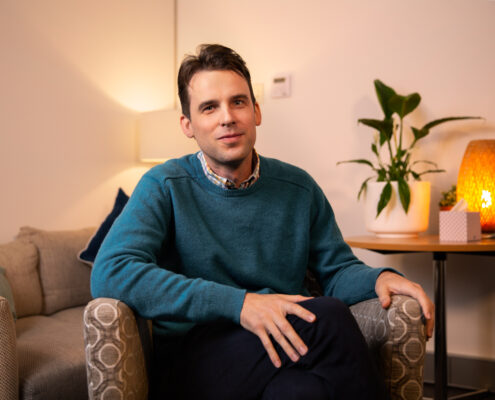
Dr Ben Buchanan | Clinical Psychologist
Dr Ben Buchanan | Clinical Psychologist
BA (Phil), GradDipPsych, Hons (Psych), DPsych (Clinical), MAPS
Dr Ben Buchanan is not currently seeing clients. We have other psychologists specialising in Body Dysmorphic Disorder within Foundation Psychology.
As a Clinical Psychologist and clinical director at Foundation Psychology, I support our team in delivering high quality psychological care.
I oversee the body dysmorphic disorder (BDD) treatment program, helping people manage body image anxiety with evidence based treatments. My work with BDD encompasses a thorough assessment of compulsive compensatory behaviours (such as mirror checking), strategies for dealing with the all consuming body related thoughts, and ultimately helping you push past BDD to lead a rich and full life where appearance is not the primary concern. Recovery from BDD is possible, and we can help you get there.
I am passionate about psychological assessment and measurement and am the director of a leading software company in the field (NovoPsych). I am also the co-founder of ReadyMind, which deliveries pre cosmetic procedure psychological assessments.
As well as working clinically I am a lecturer at Monash University’s Faculty of Medicine. As a scientist as well as psychologist my work is grounded in established evidence as well as empathy. I publish scientific peer-reviewed research on the connection between brain function and behaviour, and have undertaken academic work at the Royal Children’s Hospital’s Murdoch Research Institute and Monash Alfred Psychiatry Research Centre. In terms of clinical background, I have worked in the public mental health system, including Monash Medical Centre, Casey Hospital and Southern Health’s Child and Adolescent Mental Health Service.
I hold degrees in philosophy, behavioural science and clinical psychology. In my spare time I read books on behavioural economics and technology and I like walks in nature.
An interview with Dr Ben Buchanan
Why did you become a psychologist?
I think I became a psychologist because I was always fascinated with the motivations for why people choose what they choose, not only the rational, conscious motivations, but really the unconscious motivations, like what’s going on under the surface. And for better or for worse, I think there’s a lot going on and underneath. And I really love working with people and chatting with people to see if we can get what’s unconscious into the conscious mind.
What’s special about Foundation Psychology?
The thing that makes working at Foundation Psychology, so great, and the reason I love it is that I learned so much from clients every day, and not only from clients with their stories and experiences, but also learning from the team. All the team members here have a area of special interest, something that they are really passionate about. And so I’m constantly learning and growing from what they’re bringing. And knowing that, you know, I’ve still got a lot to learn about all of the facets of psychology. And so the team really makes it a great learning environment.
What’s different about Foundation Psychology?
One thing we do at Foundation Psychology is that we make great efforts to define with a client what success looks like for them, every client will come with a different idea of what outcomes they’re looking for. And one thing that we do as a team is think about how can we know whether we’re producing the sort of outcomes that the clients want. And we do this by measuring where the clients are at the start of the treatment process, the middle and the end by using psychometric questionnaires so we can see and measure whether the therapy that we provided has made a real difference in their lives.
